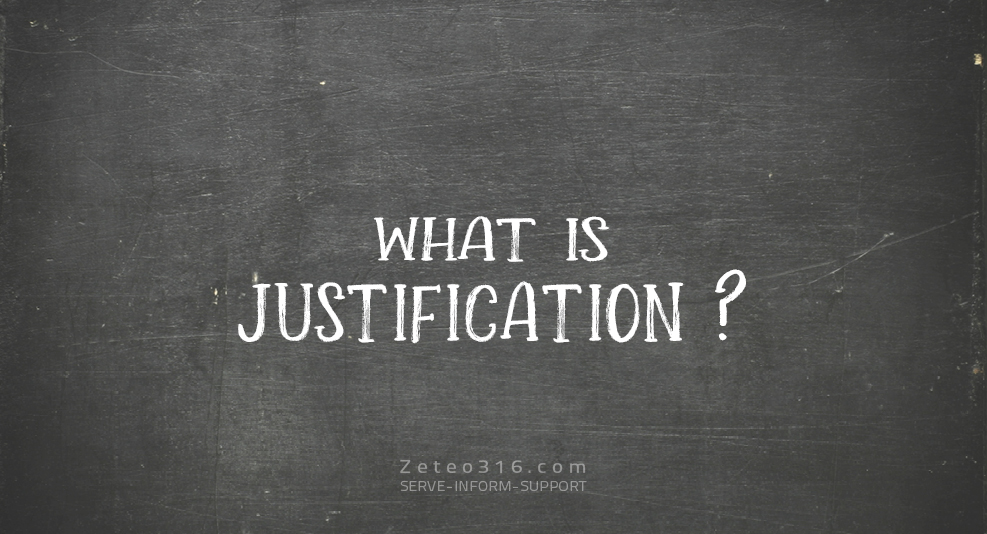
What is Justification? How or when are Christians justified? Is there any difference between Justification and Sanctification? Is there any relationship between the two?
These terms and their relationship to each other have confused me in the past. I’m not a theologian or a Bible teacher. I’ve drawn the following from theological sources. And these ought to be only trusted insofar as they align with Scripture. In other words, check your Bible.
So what is justification? GotQuestions (hopefully) puts it simply:
…to justify is to declare righteous, to make one right with God. Justification is God’s declaring those who receive Christ to be righteous, based on Christ’s righteousness being imputed to the accounts of those who receive Christ (2 Corinthians 5:21). Though justification as a principle is found throughout Scripture, the main passage describing justification in relation to believers is Romans 3:21-26:
“But now a righteousness from God, apart from law, has been made known, to which the Law and the prophets testify. This righteousness from God comes through faith in Jesus Christ to all who believe. There is no difference, for all have sinned and fall short of the glory of God, and are justified freely by his grace through the redemption that came by Christ Jesus. God presented him as a sacrifice of atonement, through faith in his blood. He did this to demonstrate his justice, because in his forbearance he had left the sins committed beforehand unpunished—he did it to demonstrate his justice at the present time, so as to be just and the one who justifies those who have faith in Jesus.”
From Grace to You:
Justification is more than simple pardon; pardon alone would still leave the sinner without merit before God. So when God justifies He imputes divine righteousness to the sinner (Romans 4:22-25). Christ’s own infinite merit thus becomes the ground on which the believer stands before God (Romans 5:19; 1 Corinthians 1:30; Philippians 3:9). So justification elevates the believer to a realm of full acceptance and divine privilege in Jesus Christ.
Just that first line from GTY is wonderful, isn’t it? Consider that God also adopts us into His family! But how is Sanctification connected in the process?
From GTY:
Justification is distinct from sanctification because in justification God does not make the sinner righteous; He declares that person righteous (Romans 3:28; Galatians 2:16). Notice how justification and sanctification are distinct from one another:
Justification imputes Christ’s righteousness to the sinner’s account (Romans 4:11b); sanctification imparts righteousness to the sinner personally and practically (Romans 6:1-7; 8:11-14).
Justification takes place outside sinners and changes their standing (Romans 5:1-2), sanctification is internal and changes the believer’s state (Romans 6:19). Justification is an event, sanctification a process.
This is important:
If sanctification is included in justification, the justification is a process, not an event. That makes justification progressive, not complete. Our standing before God is then based on subjective experience, not secured by an objective declaration. Justification can therefore be experienced and then lost. Assurance of salvation in this life becomes practically impossible because security can’t be guaranteed. The ground of justification ultimately is the sinner’s own continuing present virtue, not Christ’s perfect righteousness and His atoning work.
Again, John MacArthur notes that Justification is a one time event while sanctification is a process: “God does not justify whom He does not sanctify, and He does not sanctify whom He does not justify.” At the heart of all this is that your salvation is not dependant upon your future works. Salvation is by faith only. You cannot justify yourself.
The point where we often stumble is when we question our sanctification process because we still see sin in our lives. This is a biggie. Here we must be careful to not fall into the trap of legalism, which essentially downgrades God’s grace. Not everyone experiences sanctification at the same rate. Moreover, everyone experiences valleys of backsliding to varying degrees.
In Him [Christ], you also, after listening to the message of truth, the gospel of your salvation– having also believed, you were sealed in Him with the Holy Spirit of promise, who is given as a pledge of our inheritance, with a view to the redemption of God’s own possession, to the praise of His glory. Eph 1:13-14
To God be all the glory!
More resources at Monergism
